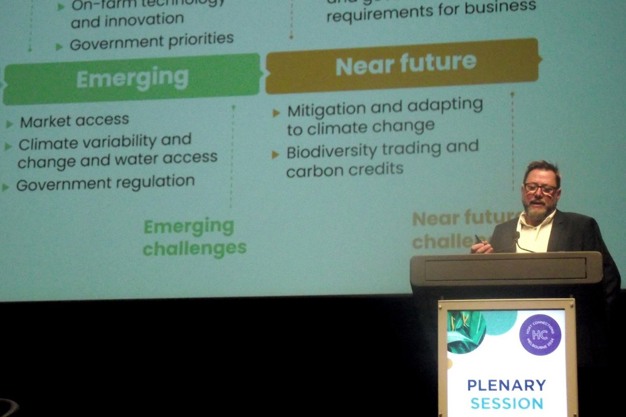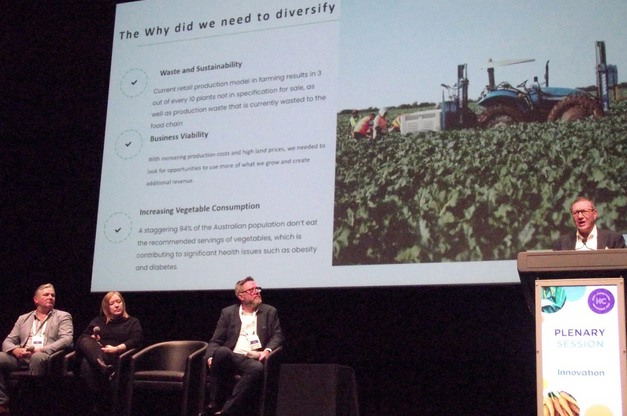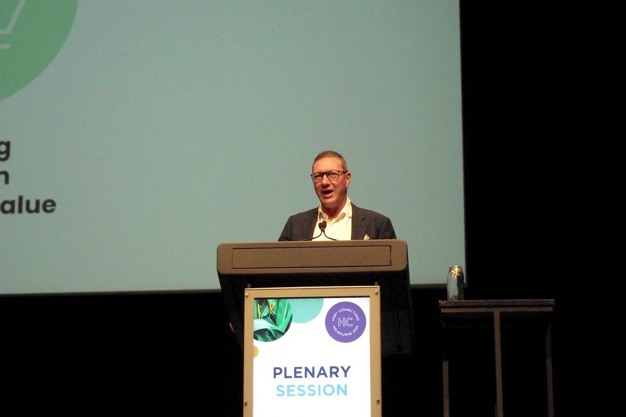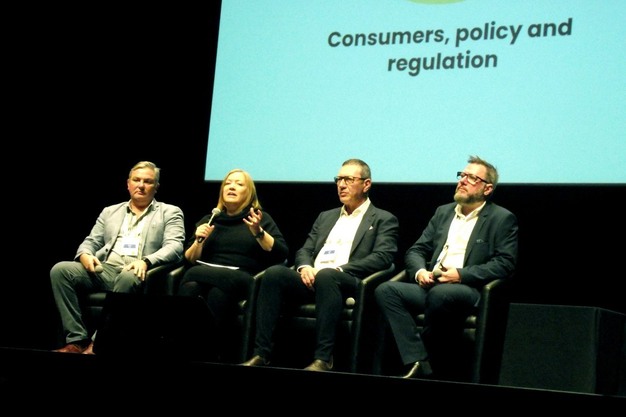While consumers want the industry to provide sustainably produced fruit and vegetables, they are not willing to pay extra for it - that was one of the key messages from this year's State of the Industry panel at Hort Connections.
This year, the annual event at the conference took a different approach this year with the panel looking at trends from the annual "Future Trends Report". The document focused on four key theme areas, including Economic Overview and Policy Update, Consumer Trends, Resilience and Diversification and Climate Change, Adaptation and Innovation.
"We hope it it is a tool for everyone to guide their businesses over the coming years," Ben Hoodless, CEO ANZ International Fresh Produce Association said. "It really identifies the key trends that are impacting the market and us into the future, and it has been laid out into the current, immediate and emerging and new trends that we need to be mindful of. What we are seeing is the continued impact on the consumer, and how that is playing out in terms of consumption of fresh produce. Ultimately, the industry must adapt to the government and make demands for sustainable practices and commit to reducing agriculture's environmental impact."

He noted the main consumer trends have not changed much over the past twelve months, with people still concerned about financial security and the increased cost of living, while consumers are continuing to do less 'discretionary' spending and are switching to less expensive alternatives. That means away from brands towards private labels.
CEO and Executive Chairman of Fresh Select John Said was one of the panel members and explained the importance of diversification in modern-day farming. One of the examples of this is that Fresh Select established a separate business in 2019, Nutri V. The aim was to turn surplus vegetables that would otherwise go to waste on farms into vegetable powders and snacks, giving food waste a second life, and farmers an additional revenue stream. He says it not only reduces food waste but also increases consumer consumption.
"We can't take away the fact that we have food waste and that food waste contributes to cost and expenses," he said. "A lot of it does go to landfill and cause us a lot of pain and grief dealing with it. Everyone in the supply chain has a responsibility to deal with their own food waste. Waste is a big part of our company, for example, under our current farming model, it's fair to say between 2-3 out of 10 plants that go into the ground don't get harvested. What that looks like, in the last financial year, we sold 14 million kilograms of soft vegetables and 4.2 million behind because they didn't meet specifications, they were damaged or something wrong that we couldn't rectify. The cost of that 4.2 million kilograms left behind is around $4million. So, setting up a company that allows us to use excess supply or food waste into nutrient-dense powers to allow them to go into products that will increase the vegetables Australians consume, became a no-brainer."

Fresh Select and Nutri V have high and ambitious targets for the future, believing that there can be 100% yields are achievable one day through repurposing crops and re-investing into the next harvest. The business is already aiming to increase the current number of products on the market from 7 to 30 products, diverting nearly 7,000 tonnes of food that would have gone to waste. That will equate to around 60 million extra servings of vegetables for consumers.
Mr Said also added that he doesn't believe that Australia has a level playing field and will struggle to compete against the rest of the world using current practices unless the industry embraces change.
"We need to come up with technology that enables us to reduce labour costs and reduce input costs because our competitors around the world will be subsidised in some form which is quite frightening," he said. "Out of all that we need to increase our consumption. It is no laughing matter that we are eating less fruits and vegetables. We must focus on bucking that trend. Having said that, I don't think a consumer wants to pay more for a sustainable product. It will become an expectation that consumers pay the same price. One thing that I am certain about is that if we, as food producers, can consistently produce food and increase our yields I am certain that we can keep a curb on our costs and consumers will be able to afford the sustainable food and sustainable businesses that we aiming for."

Emma Herd is a Partner in Climate Change & Sustainability, and Co-Leader of the EY Net Zero Centre at Ernst & Young - and she had a similar message that sustainability was consumer-driven and that it has rushed up on the industry over the last decade, from being "on the periphery to being everywhere".
"It's not just the demographic shift that is coming through in consumer spend and consumer power, it is happening in every demographic - in different ways and for different reasons," she said. "But it has created some cloudy signals in that they want things to be incredibly environmentally sustainable, but they don't want to pay any more for it. That's a recurring message across every industry and sector. It is coming through on things like plastics and packaging as well as concerns over food quality, freshness and waste. Most importantly, in terms of hort, it's coming through in things like brand trust and who they believe is going to sell them products and services that they trust to be doing the right thing as a company. At the point of production, manufacture, sale and who they are buying from all matter to consumers in different ways. So that driver is really strong."

In a regulation sense, Ms Herd brought up that there is soon to be a mandate for climate reporting will be embedded in a company's financial policy, under the Corporations Act, where it needs to be disclosed alongside financial reports, and audited - and CFOs will be responsible and liable for climate policy.
"This will flow right down the value chain because, for many organisations, the only way that they can report their full emissions is to get the whole supply chain to report to them," she said. "That data and disclosure will be hugely important, but it is also an opportunity because in the past if you chose to be more sustainable and differentiate from your peers, it's usually had a cost imposed. The impact of regulation is that it will mandate the minimum, so you are competing on performance, not on cost, and additional cost due to sustainability. So, it's an opportunity for those who want to compete on sustainability."
The full report is available online, but only to IFPA members - for more information, click here.
